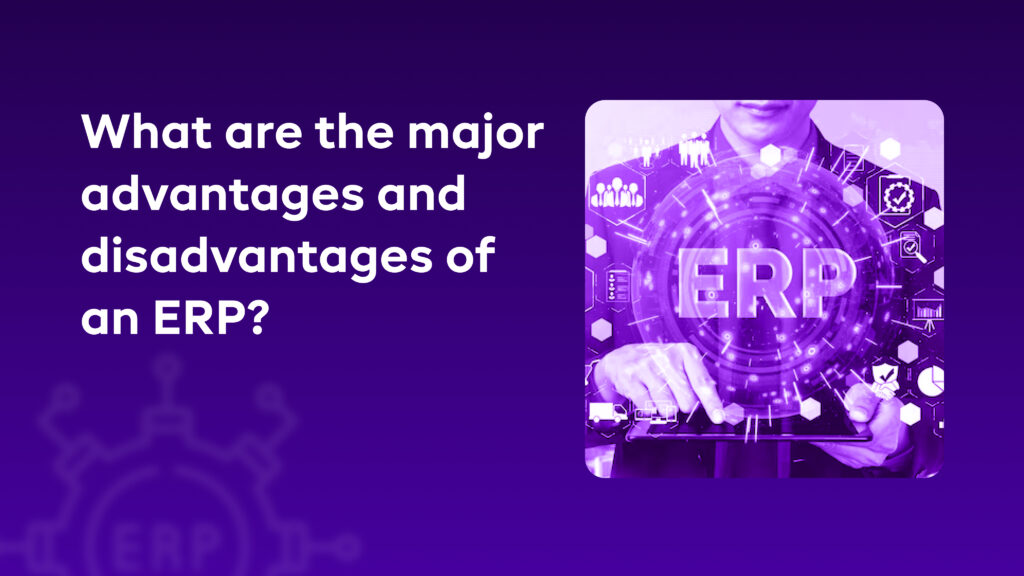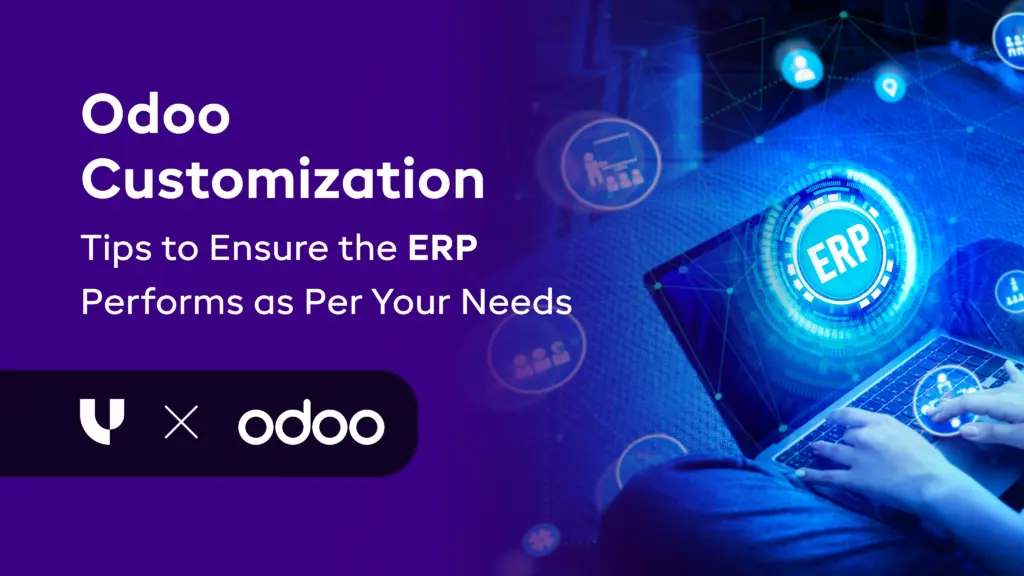Major Advantages and Disadvantages of ERP Systems 2025 Guide
Published on December 20th 2022

Introduction
Enterprise Resource Planning (ERP) systems have evolved from being luxury tools for large corporations to essential software for businesses of all sizes. They integrate multiple business functions, finance, sales, HR, supply chain, inventory, and customer service to a unified platform.For decision-makers in 2025, ERP is no longer just about automation; it’s about real-time intelligence, scalability, and competitive advantage. As highlighted in these 9 ERP implementation phases, proper planning can significantly increase success rates. However, like any technology investment, ERP has both advantages and disadvantages that can make or break its success.This guide takes you through the benefits that make ERP a game-changer and the drawbacks you need to prepare for, so you can make a well-informed decision.
What is an ERP System?
An ERP system is an integrated software platform that unifies various core business processes into a single, centralized system. Instead of using separate tools for accounting, HR, inventory, and sales, ERP connects them under one roof, allowing data to flow seamlessly across the organization.Typical ERP Modules Include :
- Finance & Accounting– budgeting, reporting, payroll, tax compliance.
- Human Resources (HR) – recruitment, onboarding, performance tracking.
- Inventory & Warehouse Management – stock control, barcode scanning.
- Supply Chain & Logistics – procurement, shipping, vendor management.
- Sales & Marketing – CRM integration, lead tracking, campaign analytics.
- Manufacturing – production planning, quality control, shop floor management.
- Customer Service – case management, feedback tracking.
Modern ERP features in 2025 :
- Cloud deployment for anytime, anywhere access.
- AI-driven analytics for forecasting and anomaly detection.
- Low-code/no-code customization to quickly adapt workflows.
- Integration with IoT devices for real-time operational data.
7 Advantages of ERP for Streamlining Business Operations
ERP connects your business functions, automates repetitive tasks, and gives you real-time visibility into performance. Let’s look at the key advantages below.
1. ERP centralizes all your business data for easier access and accuracy
With ERP, you no longer have to juggle between different systems or scattered spreadsheets. All your critical business data—from finance and sales to inventory and HR—is stored in a single, unified platform. This eliminates duplication, ensures data consistency, and allows for real-time updates across departments, resulting in more reliable insights and faster decision-making.To see how centralization works in practice, explore the key features and types of ERP systems that help businesses improve efficiency and accuracy.What this means for your business :
- No more data silos—everyone works with the same up-to-date information
- Reduced errors from manual data transfers
- Easier compliance and reporting with a single source of truth
2. ERP improves collaboration by connecting every department in real time
Instead of teams working in isolation, ERP ensures that sales, finance, operations, and HR have instant access to each other’s updates. This connected workflow allows for smoother communication, faster approvals, and more aligned decision-making. Everyone can see the bigger picture instead of working with fragmented information.What this means for your business :
- Quick updates between departments without endless email chains
- Faster approval processes for orders, budgets, or requests
- Shared visibility reduces misunderstandings and rework
3. ERP boosts productivity through automation of routine tasks
Manual tasks like data entry, report generation, and inventory updates take valuable time away from strategic work. ERP automates these processes, freeing up employees to focus on higher-value activities. Automation also helps reduce delays and human errors, ensuring faster and more accurate outcomes.What this means for your business :
- Less time spent on repetitive admin work
- Fewer delays caused by manual processes
- Ability to handle more work without increasing headcount
4. ERP scales effortlessly as your business grows
As your business expands, ERP can easily adapt by adding new modules or integrating with other tools—without the need for a complete overhaul. It supports multi-location operations, handles increased data loads, and adjusts to changing market conditions, making it a future-ready investment.If you’re in the growth phase and wondering how to choose the right ERP for scalability, this ERP selection guide.What this means for your business :
- No need to replace systems during expansion
- Smooth onboarding of new teams or locations
- Ability to quickly adapt to industry or market shifts
5. ERP gives you better decision-making power with real-time insights
With all business data flowing into a single platform, ERP provides up-to-the-minute reports and analytics. Managers and decision-makers no longer have to rely on outdated or incomplete reports—they can act based on what’s happening right now.What this means for your business:
- Instant access to accurate business performance data
- Ability to spot trends and problems early
- Data-driven decisions instead of guesswork
6. ERP enhances customer service by improving response times and accuracy
Customer-facing teams can quickly access stock levels, order histories, and delivery timelines, making it easier to respond to inquiries without delays. With fewer errors and faster processes, customers enjoy a smoother and more reliable experience. What this means for your business:
- Faster response to customer queries
- Fewer mistakes in orders and deliveries
- Stronger relationships through reliable service
7. ERP strengthens compliance and audit readiness
Many industries require strict record-keeping and regulatory compliance. ERP makes it easier by maintaining accurate logs, access histories, and automated reports. This ensures your business is always prepared for internal or external audits. What this means for your business:
- Always up-to-date records for compliance checks
- Faster preparation for audits and inspections
- Reduced risk of penalties for missing documentation
Understanding ERP Limitations to Plan Better
While ERP systems bring tremendous value, no technology is flawless. Being aware of possible limitations allows you to plan proactively, allocate resources wisely, and ensure a smooth implementation. By understanding these challenges, businesses can set realistic expectations and prepare strategies to overcome them, turning potential roadblocks into opportunities for improvement. If you’re wondering whether now is the right time to invest in ERP, our guide on how ERP can help your business and when you might need it walks you through the key benefits and timing considerations.
1. High Initial Investment
ERP solutions often require a significant upfront cost for licensing, infrastructure, and setup. This can feel daunting, especially for SMEs.Key considerations:
- Licensing and customization costs can add up quickly if the business needs specific features.
- Hardware or cloud subscription expenses are recurring commitments to budget for.
- Implementation partner fees are necessary for expert deployment but can be underestimated.
2. Lengthy Implementation Timelines
ERP isn’t plug-and-play; depending on complexity, it can take months to go live.Potential impacts:
- Disruption to normal operations if employees are balancing project work with daily tasks.
- Training periods may slow down productivity in the short term.
- Delays in ROI realization if timelines extend beyond the plan.
3. Resistance to Change
Employees accustomed to existing workflows might be hesitant to adopt new systems.Why this matters:
- Learning curves can lead to frustration and initial productivity dips.
- Pushback from teams can delay adoption and reduce system effectiveness.
- Cultural shifts may be required to fully leverage ERP capabilities.
4. Risk of Over-Customization
While ERP systems are flexible, over-customizing can create complexity and future headaches.Possible drawbacks:
- Higher maintenance costs as custom code needs updates with every software upgrade.
- Compatibility issues with vendor updates or new modules.
- Reduced scalability if the system becomes too rigid to adapt to future needs.
5. Data Migration Challenges
Moving data from legacy systems to ERP isn’t always straightforward.Common issues:
- Data quality problems such as duplicates or outdated records impacting accuracy.
- Incomplete transfers leading to missing information in the new system.
- Integration difficulties with existing third-party tools.
Turn ERP Limitations into Opportunities
With the right strategy, ERP can be your biggest growth driver. Let’s build a plan that works for your business.
Get Your ERP Strategy
Transform Your Business Operations with Uncanny’s ERP Expertise
Implementing ERP isn’t just about setting up software, it’s about bringing your business together in a way that makes work easier and helps you grow. At Uncanny, we take the time to understand how your business works, tailor the system to fit your needs, and guide you through the whole process smoothly. Whether you want to improve efficiency, keep your data accurate, or handle growth without headaches, our ERP services are here to help you get real results.If you’re ready to make your business run better and faster, reach out to us today. Let’s talk about how we can support your journey to simpler, smarter operations.
FAQs
Q1: What are the main benefits of using an ERP system?
ERP systems centralize business data, automate routine tasks, provide real-time insights, improve collaboration, and help businesses scale smoothly.
Q2: How does ERP improve decision-making?
ERP offers real-time analytics and dashboards, giving leaders up-to-date information to make faster, more informed decisions.
Q3: Is ERP suitable for small businesses?
Yes, many ERP solutions are scalable and customizable to fit small business needs, but it’s important to consider costs and implementation complexity.
Q4: What are the common challenges when implementing ERP?
Challenges include high upfront costs, complex setup, employee resistance, and the need for ongoing maintenance. Planning and training can mitigate these issues.
Q5: How long does it take to implement an ERP system?
Implementation can range from a few months to over a year, depending on business size, complexity, and customization needs.
Q6: Can ERP systems integrate with existing software?
Most modern ERP platforms offer integration capabilities with other tools like CRM, payroll, and supply chain software.
Q7: How does ERP help with regulatory compliance?
ERP systems often include built-in compliance features such as audit trails and reporting tools to help meet industry regulations.
Q8: What is the cost of implementing ERP?
Costs vary widely based on software, customization, training, and support but expect an upfront investment plus ongoing expenses
Q9: How can businesses overcome employee resistance to ERP?
Providing thorough training, clear communication about benefits, and involving users early in the process can improve adoption.
Q10: What industries benefit most from ERP?
Manufacturing, retail, healthcare, distribution, and service industries often see the greatest benefits from ERP systems.

About Author


